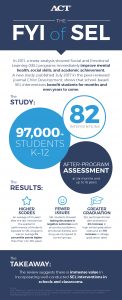
The following blog was contributed by Jonathan Martin, Program Director, Partner Engagement at ACT, Inc.
Soft skills, 21st century skills, life skills, social and emotional learning (SEL)—call it what you will—semantics aside, the idea that nonacademic factors like empathy, self-awareness and self-management are critical to student success is no longer up for debate.
In fact, the evidence in support of the value of SEL for enhancing students’ academic performance is strong.
Research reveals that students who participate in school-based programs focused on SEL benefit in multiple ways as compared to students who do not experience programming in SEL.
Benefits include improvements in prosocial behavior; attitudes about self, others, and school; reductions in problem behaviors and emotional distress; and an increase in standardized achievement test scores.
A follow-up study, published in 2017, concluded that SEL programs have short and long-term positive consequences for students.
The study, “Promoting Positive Youth Development Through School-Based Social and Emotional Learning Interventions: A Meta-Analysis of Follow-Up Effects,” found, “in follow-up assessments an average of 3.5 years after the last intervention, the academic performance of students exposed to SEL programs was an average 13 percentile points higher than their non-SEL peers, based on the eight studies that measured academics.”
Moreover, the public demand for the development of social and emotional learning skills, is high. According to the 49th Annual PDK Poll of the Public’s Attitudes Toward the Public Schools, 82% of the public said that helping students develop cooperation, respect, problem-solving and other SEL-based skills is extremely or very important.
The demand is clearly there, but how do we effectively measure SEL and attach accountability measures to its competencies to improve outcomes?
More study, experimentation, and honest feedback is needed so that school districts can take inspiration from exemplars across the world. Together, educational leaders and policymakers can tackle the challenges that come with implementing a social and emotional learning system in the classroom.
Our solution, ACT® Tessera®, is a field-tested and proven SEL assessment that schools and districts can use to support student learning and holistic education. It is an easily administered assessment that provides useful data on what’s working and what’s not, in order to evaluate the impact of improved social and emotional learning. It’s a system that seeks to raise the quality of teaching and learning of these vital skills by offering leadership coaching for school administrators, as well as a comprehensive teacher playbook.
You can learn more about the assessment system and view more evidence in support of SEL at www.act.org/tessera.
What you call it doesn’t matter, but how you measure and improve upon it can make all the difference.
NCEA is hosting a webinar entitled “Strengthening SEL in Your School: Taking a Comprehensive Approach to Program Development” on Tuesday, February 19, 2019 at 4 PM EST. Registration is available online.
